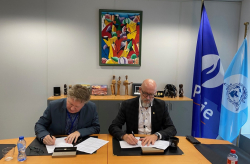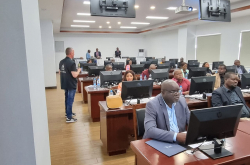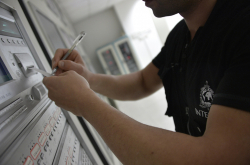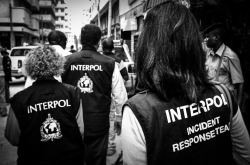Facilitating data exchange
INTERPOL’s Global Maritime Security Database is central to the sharing of information between law enforcement, military, and judicial bodies across multiple countries.
Information on maritime crime is contributed by our National Central Bureaus and other relevant law enforcement and partner agencies. Our analysts are then able to assess regional maritime crime and piracy threats and produce intelligence reports.
This information is invaluable to regional agencies in their ongoing efforts to disrupt maritime crime and in building the necessary relationships.
Our systems of Notices (colour-coded international alerts) and Diffusions (a less formal alert mechanism) are also key to sharing data and arresting suspected criminals.

Strengthening first responder and law enforcement capabilities
The process of investigating incidents and collecting evidence in the maritime environment is complicated as a number of different jurisdictions are typically involved in a single incident.
We provide training, equipment and mentoring to member countries worldwide in order to improve their investigative capabilities, the quality and quantity of data collected, and to help ensure potential evidence is properly preserved and analysed.
Close cooperation between law enforcement and judicial services is essential in order to increase the likelihood of successful prosecutions. We help forge links between police and prosecutors – within the same country and across jurisdictions − supporting them in all stages of an investigation, from evidence collection through to trial.

We run a range of projects to support these objectives in key geographical areas:
- The Port Security Project (PSP), East and Southern Africa and the Indian Ocean, sponsored by the European Union;
- The Red Sea Project (RSP), Northeast Africa and the Gulf of Aden, sponsored by the European Union;
- The Project Safe Seas, East Africa and the Indian Ocean, sponsored by the European Union;
- The Project Compass, East Africa, Southern Africa and Indian Ocean (EA-SA-IO) region, sponsored by the United States Department of State, Bureau of International Narcotics and Law Enforcement Affairs (INL);
- Project AGWE, West Africa, sponsored by the United States Department of State, Bureau of International Narcotics and Law Enforcement Affairs (INL);
- Project WATA,West Africa, sponsored by the Ministry of Foreign Affairs of Denmark.
On-the-ground support
INTERPOL can send a team of experts, known as an Incident Response Team, to assist with the crime scene investigation and evidence collection.
Related news

Breakthrough in longstanding Dutch missing person case
11 October 2024
INTERPOL welcomes new DNA legislation in Belgium
11 April 2024








